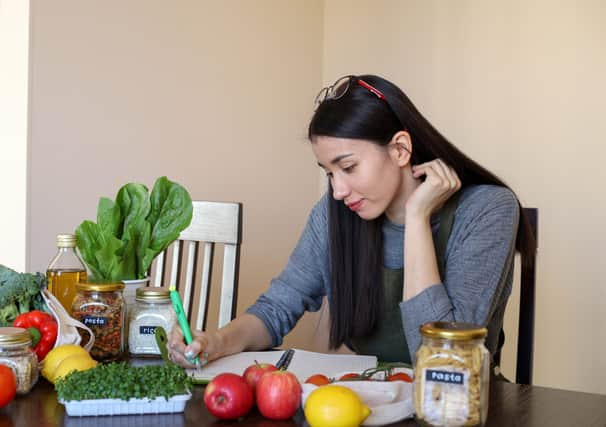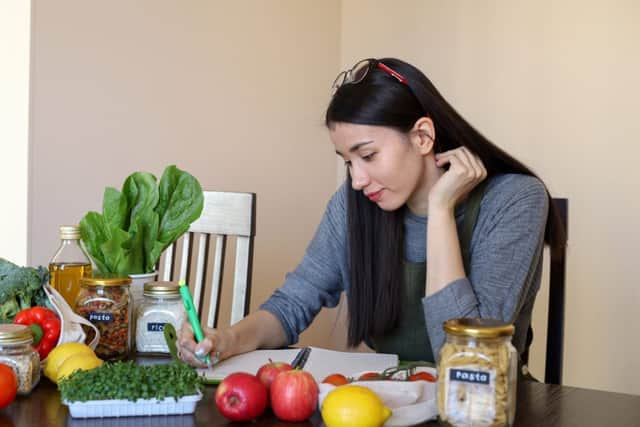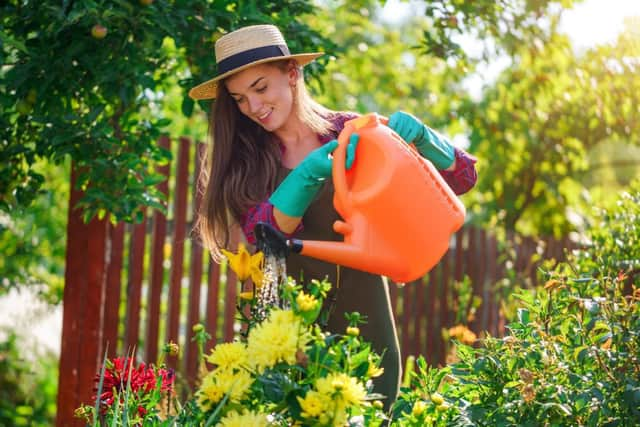Going Green - Ideas for shopping smarter and cutting down on food waste


Latest article from Angela Terry
Green Green campaigner and consumer expert, Angela Terry, separates climate change facts from fiction and here she explains how you can take simple, practical steps to help save the planet. Follow @ouronehome & visit https://onehome.org.uk/ for more advice.
Q: Have you any ideas for wasting less food? Too often, I end up putting items from my fridge straight into the bin.
Advertisement
Hide AdAdvertisement
Hide AdA: Reducing food waste is one way we can all cut our shopping bills, as well as help save the planet.
In the UK we bin 6.5 million tonnes of food each year, of which 4.5 million tonnes is still edible.


That equates to a staggering £700 for an average family and lots of carbon emissions that could have been avoided.
Our grandparents had the right attitude to avoiding food waste.
Advertisement
Hide AdAdvertisement
Hide AdWe could all do with embracing some good old-fashioned thriftiness!
Here are some of my tips to get you started ...
Shopping
Plan a menu and shopping list for the week, so you don’t put things you don’t need in the trolley.
Try to avoid ‘buy one, get one free’ deals unless you genuinely need two of something for your meal plans.
They just encourage food waste, so say ‘Bog off!’ to BOGOFs!
Advertisement
Hide AdAdvertisement
Hide AdBulk buy staples like rice, flour and pasta to cut down on packaging and save money.
Also, look out for meat alternatives.
Meat is very expensive.
A University of Oxford study found that meat-free eating can reduce your costs by up to one third.
Chickpeas, lentils or beans are more affordable and healthier too.
You can use them to make protein-packed meals that taste amazing.
Advertisement
Hide AdAdvertisement
Hide AdFood storage
When storing items in the fridge, put those with the shortest shelf-life at the front, so they’re eaten first.
Some food goes off quickly once packaging is opened so write the date that you first opened it to remind you that it needs eating.
While ‘use by’ dates need to be followed for health reasons ‘best before’ dates are just a guide.
Fruit and veg scraps and peelings
If you have a local food waste collection, make sure to add fruit and veg skins, peel, pips, stones and cores to your council caddy.
Advertisement
Hide AdAdvertisement
Hide AdBy increasing recycling rates you’re ultimately helping your council tax bill from rising too much.
If you don’t have a local food waste collection, any fruit and veg scraps can be turned into garden compost.
Leftovers
Always keep leftovers.
You can freeze them or turn them into next day’s lunches.
Leftover veg, for example, can easily be made into soup.
Stale bread can be made into bread and butter pudding – or blitzed into breadcrumbs that you can use in a whole host of recipes.
Alternatively, you can investigate apps like Olio, which enable you to find or share surplus food. Such a great idea!
Advertisement
Hide AdAdvertisement
Hide AdCelebrity spot
Electric – or e-bikes – are latest trend among Hollywood A-listers. Celebrities including Kylie Jenner.


Other celebrity e-bikers include Leonardo DiCaprio and Ellen DeGeneres who have all ridden them.
Early adopter, Star Trek’s Captain Kirk, William Shatner, bought his first in 2012.
During lockdown, Total Recall star Arnold Schwarzenegger was frequently spotted around LA on his e-bike – explaining on social media that it was a good way to exercise while socially isolating.
Advertisement
Hide AdAdvertisement
Hide AdScreen legend Goldie Hawn also rode her e-bike to escape quarantine.
Green swap
When seeking ornaments or decorations to brighten up your home, seek out vintage finds in charity shops and on eBay instead of buying new.


Not only will they add much more charm and character to your interior, they also have a much smaller carbon footprint.
How best to save water when you’re gardening
Our weather is changing.
Hotter, drier summers and increasingly unpredictable rainfall mean the threat of drought in the UK is now real.
Advertisement
Hide AdAdvertisement
Hide AdBy 2050, the Environment Agency estimates that summer rainfall is expected to decrease by 15 per cent.
As a result, it’s a very good idea to start using water more efficiently.
Here are some suggestions ...
Water carefully
Use a watering can instead of a hose. Water early in the morning or in the evening, so the water doesn’t evaporate in the heat of the sun.


Prioritise young plants and seedlings, as older plants will have a greater capacity to cope.
Advertisement
Hide AdAdvertisement
Hide AdHold off watering until you see plants starting to wilt. Too much watering can weaken them.
Catch rainwater
Save rainwater in a butt and then use it to water plants during dry periods.
It’s one of the best ways to manage the water in your garden efficiently.
Most of the big DIY outlets sell them. They cost from around £30.
Choose hardy plants
You can start planting drought-tolerant plants.
Advertisement
Hide AdAdvertisement
Hide AdLook out for ones with silver leaves that reflect the sun, like artemisias.
They tend to be better placed to deal with hot spells.
Mediterranean plants have evolved in a warmer climate and are also a great choice. Think geraniums or lavender.
The Royal Horticultural Society’s website has more info on suitable plants.
Mulch around plants
Loose mulches – like wood chips or rough home compost – placed around established plants help them to conserve water longer.
Advertisement
Hide AdAdvertisement
Hide AdLook after your lawn
Your lawn could well end up looking brown and parched, but that doesn’t mean it’s dead. It should reinvigorate itself once rain falls.
Let your grass grow long, as it’s better able to store water that way.
If you are redoing your lawn, consider planting it with a hardy grass variety, like smooth stalked weather grass. Better still, swap sections of it for ground-covering plants or a wildflower meadow.
Enrich your soil
The healthier your soil is, the better it will be able to support plants through drought. Make sure to add lots of organic or homemade peat-free compost.
Advertisement
Hide AdAdvertisement
Hide AdYou could also consider adding a special kind of eco-friendly charcoal, known as ‘biochar’, which has been shown to help improve soil’s water holding capacity.
Recycle greywater
In times of shortage, you can water your plants using ‘greywater’, the used water from your showers, baths and sinks.
Bubbles are OK!
Fact or fiction
Appliances not in use don’t use power. False!
‘Vampire’ devices – like computers, broadband routers and games consoles – use energy just by being plugged in.
British Gas research says they cost UK households on average about £147 per year!
For previous articles visit:
Advertisement
Hide AdAdvertisement
Hide AdAdvertisement
Hide AdAdvertisement
Hide AdAdvertisement
Hide AdAdvertisement
Hide Adhttps://www.yorkshireeveningpost.co.uk/read-this/going-green-use-green-cleaning-products-to-make-your-home-sparkle-3598217